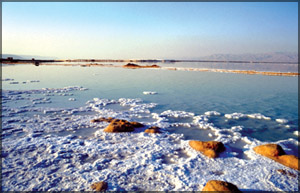 The Dead Sea - a salty wonder The Dead Sea - a salty wonder
Nature is responsible for some of the weirdest phenomena
(occurrences) on Earth. Otherwise, how do you explain such things as
water keeping people afloat and mud possessing healing powers? To
understand the reality of these phenomena, look no further than the Dead
Sea.
 The Dead Sea is, in fact, a salt lake which resides between the West
Bank and Israel to the west, and Jordan to the east. The West Bank, also
referred to as 'Judea and Samaria', is a land-locked territory on the
west bank of the Jordan River in the Middle East. Its shores are the
lowest point on the surface of the Earth that is on dry land, and are
located 420 metres below sea level. The Dead Sea is, in fact, a salt lake which resides between the West
Bank and Israel to the west, and Jordan to the east. The West Bank, also
referred to as 'Judea and Samaria', is a land-locked territory on the
west bank of the Jordan River in the Middle East. Its shores are the
lowest point on the surface of the Earth that is on dry land, and are
located 420 metres below sea level.
But, why is this called the Dead Sea? Doesn't it give a rather creepy
feeling with the word 'dead' being associated with it? It has been given
this name because no life forms can live in it. No sea weed, fish not
even the toughest sea creatures that survive in the Mariana Trench - the
deepest point on Earth - can live in this environment. This is due to
the level of salt in the Dead Sea, which is the 'saltiest' water on the
planet.
If, by any chance, fish accidentally swim into the waters from one of
the freshwater streams that feed the Sea, they are killed instantly. are killed instantly.
Their dead bodies quickly get coated with a layer of salt crystals,
which act as a protective layer. These carcasses are then tossed onto
shore by the wind and waves, and this alone shows how hostile it is to
living beings.
However, this has become quite a gift of nature to humans since the
high mineral content, high oxygen density and high atmospheric pressure
have become properties which can heal a range of diseases.
***
How it was formed
The birth of the Dead Sea is associated with Plate Tectonics, which
is a subject that we have addressed in many editions of Geo Facts. In
the region where the Dead Sea is situated, there is a crevice or opening
forming because two Earth plates are spreading apart. The Sea is located
right along this crevice where the Earth's crust is being stretched
thin.
A good comparison would be to think of an instance of you pulling a
new chewing gum apart. You'll see where it starts to come apart; it gets
really thin just before it breaks. That's what is happening to the
Earth's crust in the region of the Dead Sea.
When the Earth's crust gets thin, that part of the surface sinks
downward. This is a continuous process, and the Dead Sea is still
sinking lower, even today. Scientists have figured out that the depth
increases by as much as 13 inches per year, and on a geologic time
scale, that is considered extremely fast.
Significance of Dead Sea water
 The water of the Dead Sea is said to be six times saltier than
ordinary sea water. Its surface contains the least salty water, with the
saltiness increasing as you go down deeper. The water of the Dead Sea is said to be six times saltier than
ordinary sea water. Its surface contains the least salty water, with the
saltiness increasing as you go down deeper.
It has been calculated that the salt concentration can be as high as
three kilograms of salt per ten kilograms of sea water at a depth of 130
feet. The saltiness increases as you proceed deeper, and at about 300
feet, the sea water gets saturated.
This means that no more salt can dissolve in the sea water, since the
water has reached the maximum limit to which salt can dissolve in it.
Therefore, any extra salt is piled up at the bottom of the sea without
being dissolved in the water and this makes a truly peculiar (strange)
ocean bottom.
The question as to why it is so salty would still be hovering in your
mind. The Dead Sea is constantly fed water from the rivers and streams
coming down off the mountains that surround it. This might sound
ordinary as a normal sea.
But the key thing to understand is that water which comes in to the
Dead Sea doesn't have a way out other than through evaporation. Since
this is a very hot region, evaporation happens really fast; it leaves
behind all the dissolved minerals in the sea, making it saltier every
minute.
The combined process of minerals being brought into the Dead Sea
through waterways and constant evaporation gives rise to this peculiar
phenomenon which makes this a mineral repository (store).
The most exciting fact about this is that because of the extremely
high concentration of dissolved mineral salts in the water, its density
is very much higher than that of fresh water. What this means is our
bodies are more 'buoyant', or in other words, floatable, in the Dead
Sea. Amazingly, our bodies become so buoyant in the Dead Sea that a
person only needs to lie on the water and he will be just left afloat.
Compiled by Aravinda Dassanayake
|
